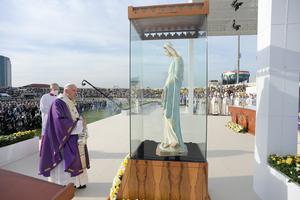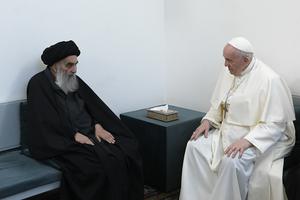Pope Francis in Iraq Triggers Biden Statement But Is It Enough?
COMMENTARY: Iraqi Christians hope the U.S. government stays the course when it comes to their recovery.

Pope Francis’ visit to Iraq this past weekend meant that, for a day or two at least, the Western media had to acknowledge the precarious situation facing Christians in the troubled nation — people who normally aren’t on their radar. These survivors of ISIS-led genocide in 2014 continue to suffer daily indignities: Even those Christians who haven’t lost their ancestral homes are officially second-class citizens.
President Biden issued a statement on the “historic and welcome first for the country.” The pope’s visit to the city of Mosul – “a city that only a few years ago endured the depravity and intolerance of a group like ISIS” — was highlighted by the president as “a symbol of hope for the entire world.” Will Biden be inspired to make sure the United States helps those survivors of the ISIS-led genocide?
The Pope broke his year-long COVID-19 lockdown to remind us — if we even knew in the first place — that Iraq was largely emptied of Christians during the violent Islamic State reign from 2014 to 2017. There were once 1.5 million Christians in Iraq, mostly made up of Catholic Chaldeans and members of the ancient independent Assyrian Church. That number has been reported to have shrunk to 250,000. Recent calculations suggest much fewer. At this rate, Christians in Iraq will simply disappear in our lifetimes. That is, unless those who remain are supported.
Iraqi Christians hope the U.S. government stays the course when it comes to their recovery.
In 2016 and again in 2017, the United States made a historic declaration that Christians and other religious minorities in Iraq had been the victims of genocide. Following these declarations, it was clear that humanitarian aid administered through the United Nations was not getting to genocide survivors.
In response, the federal government announced a radical policy: to provide humanitarian assistance to survivor communities. And in 2018 Congress unanimously passed the Iraq and Syria Genocide Relief and Accountability Act, enabling the Department of State and the United States Agency for International Development (USAID) and other entities, including faith-based groups, to respond to the needs of these survivors. The act also signaled an important awareness in the law of the role that religious identity plays both in the vulnerability of persecuted groups and in the assistance needed to rebuild and recover.
It shouldn’t be hard for President Biden to grasp that we need targeted assistance for those who are in danger of disappearing entirely from the fabric of Iraq — and, indeed, much of the Middle East. Put simply, just as the injury was a targeted attack based on religious identity, so the humanitarian response must also consider the religious identity of beneficiaries of aid.
Since the passage of the Iraq and Syria Genocide Relief and Accountability Act in 2018, aid agencies on the ground working with the Iraqi Christian community have rebuilt parts of their internal infrastructure with great success thanks to more than $389 million in USAID grants. (I say “parts of” because much of it has gone forever as many ancient churches and shrines have been reduced to rubble.) The agency announced last December furthering its commitment by dedicating in fiscal year 2020 an additional $38 million “to support religious and ethnic minority programming in Iraq.” Will the president think this investment is worth continuing?
Biden need only look to the rebuilding efforts in the Christian towns of Karamles and Qaraqosh to see that recovery is possible. Thanks to the efforts led by the Knights of Columbus and local Christian leaders the Syriac Catholic Cathedral in Qaraqosh, the Church of the Immaculate Conception was restored. Pope Francis blessed it on Sunday. The Knights also raised over $25 million dollars to rebuild the Christian town of Karamles. The result: Christian residents are returning.
Or perhaps the president might want to visit the Catholic University in Erbil. The university was founded in December 2015 by Bishop Bashar Warda, bishop of the Chaldean Catholic Diocese of Erbil, thanks to a donation from the Italian bishops’ conference. It is open to students of all cultures, faiths, ethnicities and backgrounds. Its mission is simple: to help young persecuted Iraqi by providing job opportunities and encouraging others to return back to their homelands. With a grant from USAID’s New Partnerships Initiative, the university has provided classes in business language and computer software for widows, victims of abuse and former captives of ISIS.
In addition to keeping aid flowing to local agencies working with the Christian community in Iraq, Biden can take two other important and related steps to show survivors of genocide that he stands with them.
First, the president, along with Secretary of State Antony Blinken, should prioritize religious freedom and concern for the persecuted in U.S. foreign policy. I’m not just talking about Iraqis: people such as the Uighurs of China, who are themselves victims of a state-sanctioned genocide about which Pope Francis can surely say more, deserve our attention, and their persecutors deserve our condemnation.
The second step is the prompt nomination of an ambassador at large for international religious freedom. This ambassadorship must be filed by someone ready to roll up their sleeves on behalf of the persecuted. They must be committed to America’s first freedom.
Naming a qualified and well-regarded person to this position will send a message of support to those who were persecuted and continue to live under the threat of persecution. It will also reassure the world’s leaders that international religious freedom is an American priority not subject to change after a presidential election. And that reassurance is vitally important, because leaving the post vacant will have horrible consequences.
Pope Francis implored the Christians of Iraq during his visit to remain filled with hope. “May your witness, matured through adversity and strengthened by the blood of martyrs, be a shining light in Iraq and beyond in order to proclaim the greatness of the Lord and to make the spirit of this people rejoice in God our Savior,” he told them.
The witness of these Christian martyrs is most certainly a shining light for Iraq and beyond. It’s now up to President Biden, who likes to remind us of how much his faith means to him, to do all he can to make sure it is not snuffed out.
Andrea Picciotti-Bayer is the director of the Conscience Project.
- Keywords:
- pope francis in iraq
- biden














